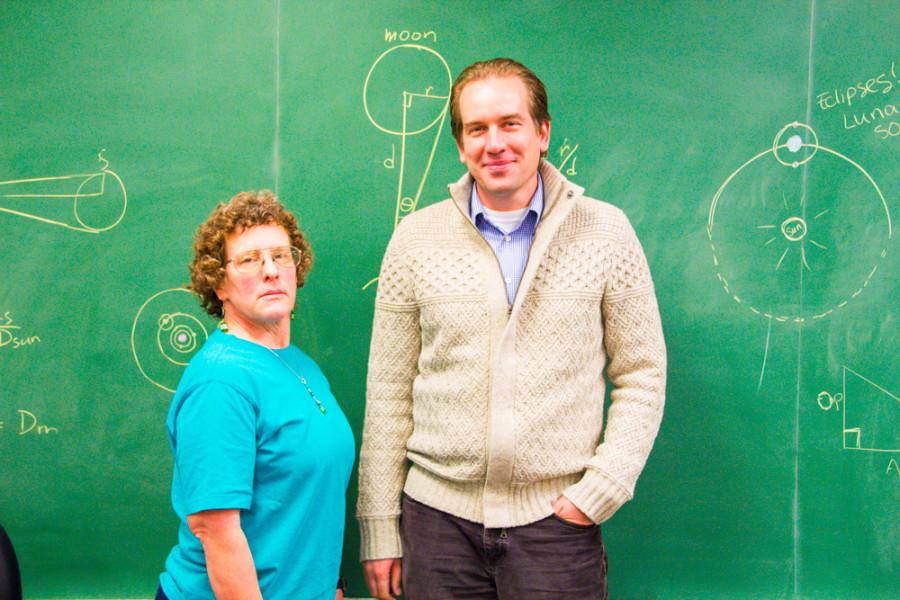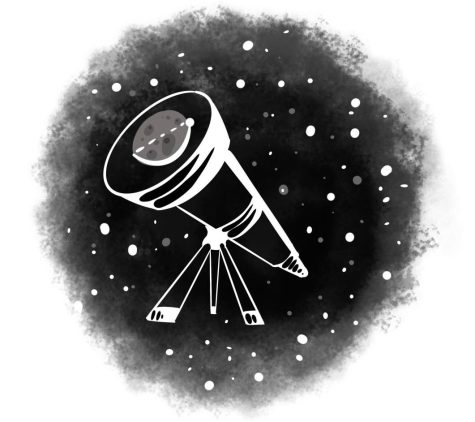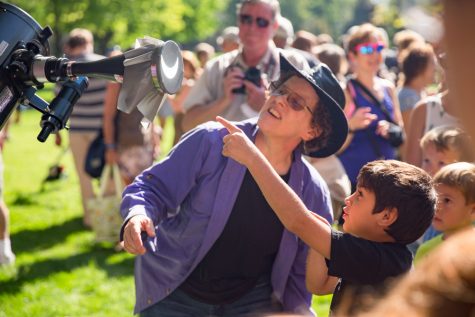Astro class cut despite popularity
Professor Dobson (left) and Professor Paust (right)
November 12, 2015
One of Whitman’s most in-demand courses will not be offered this spring, as the astronomy department was told by the Committee of Division Chairs not to offer Introduction to Astronomy.
The decision to limit astronomy courses came as a disappointment to Associate Astronomy Professors Andrea Dobson and Nathan Paust, who have worked overtime to meet demand and for years requested an additional staff member for the department. The course is being cut due to a shortfall in revenue caused by this year’s small incoming class.
One in five students at Whitman take Intro to Astronomy, many to fulfill their science distribution requirement. To offer the course every semester, Paust and Dobson generally teach 13 courses a year between them, while other faculty only teach five. This semester Intro to Astronomy has 45 students, and 23 on the waitlist who didn’t get in. It remains unclear how students are expected to meet their distribution requirements.
Provost & Dean of Faculty Pat Spencer cited the lack of faculty in the astronomy department as the reason for cutting the course. The Astronomy department has low priority in hiring a new faculty member because while many students take courses in it for distribution, few decide to major. In addition,Spencer cited the lack of room in the Science Building as a factor that prevented the college from hiring a new astronomy professor.
“The science building is overflowing. There’s no place to put people,” said Spencer.
According to Dobson, the cuts to the astronomy department are partially due to this year’s unexpectedly small class of first-years. Intro to Astronomy can be expensive due to the large number of students who must be supplied with equipment and lab space.
“The enrollment crunch for this year is going to have a ripple effect for several years as we adjust to that loss of revenue. Even if we over-enroll next year, that does not mean that there is going to be discretionary budget for the administration to work with,” said Dobson.

While Paust feels the department could do better at inspiring Whitties to pursue astronomy with more faculty, some astronomy students feel excited about both current professor’s classes.
“I think that the professors that we have are awesome and they do a great job at being really accessible,” said junior Astronomy major Riley Jordan.
Antonia Gascoyne, a first year in Introduction to Astronomy, echoed Jordan’s sentiment.
“I have loved it so far. It’s one of my favorite classes right now,” Gascoyne said.
If students wish to have more astronomy courses offered, Paust encourages them to speak up about it because student voices have affected which departments are prioritized in the past.
“Student outcry has driven changes in other departments. Biology is a huge department now. They’ve grown a lot in the last couple of years, and a lot of it was because students said, ‘We want to take biology,’” Paust said.
Moreover, a strong astronomy department might not only satisfy current students, but lure prospective students as well. According to Connell Boken, a first-year in Astro 110, Whitman’s astronomy department helped him decide that he wanted to attend Whitman.
“It was actually an astronomy course that I took during admitted students day that was part of the reason I wound up coming to Whitman,” Boken said.








